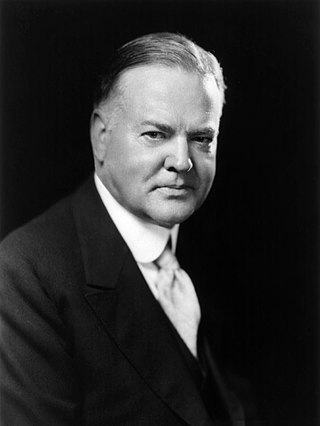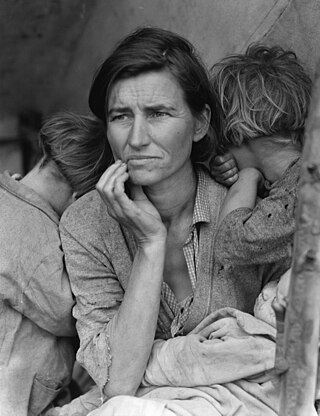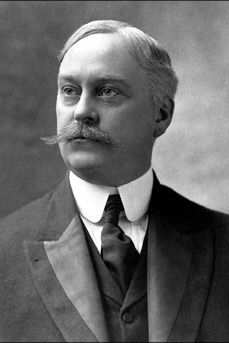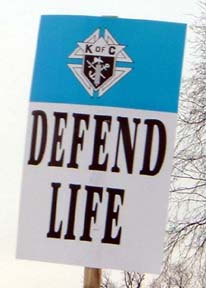Related Research Articles

Herbert Clark Hoover was an American politician and humanitarian who served as the 31st president of the United States from 1929 to 1933. He was a member of the Republican Party, and held office during the onset of the Great Depression. A wealthy mining engineer before his presidency, Hoover led the wartime Commission for Relief in Belgium and was the director of the U.S. Food Administration, followed by post-war relief of Europe. In the 1920s, he served as the U.S. Secretary of Commerce.

The Knights of Columbus is a global Catholic fraternal service order founded by Blessed Michael J. McGivney on March 29, 1882. Membership is limited to practicing Catholic men. It is led by Patrick E. Kelly, the order's 14th Supreme Knight. The organization is named after the explorer Christopher Columbus.
The Reconstruction Finance Corporation (RFC) was an independent agency of the United States federal government that served as a lender of last resort to US banks and businesses. Established in 1932 by the Hoover administration to restore public confidence in the economy and banking to their pre-Depression levels, the RFC provided financial support to state and local governments, recapitalized banks to prevent bank failures and stimulate lending, and made loans to railroads, mortgage associations, and other large businesses.

The Federal Emergency Relief Administration (FERA) was a program established by President Franklin D. Roosevelt in 1933, building on the Hoover administration's Emergency Relief and Construction Act. It was replaced in 1935 by the Works Progress Administration (WPA).

In the United States, the Great Depression began with the Wall Street Crash of October 1929 and then spread worldwide. The nadir came in 1931–1933, and recovery came in 1940. The stock market crash marked the beginning of a decade of high unemployment, poverty, low profits, deflation, plunging farm incomes, and lost opportunities for economic growth as well as for personal advancement. Altogether, there was a general loss of confidence in the economic future.

Fiscal policy is any changes the government makes to the national budget to influence a nation's economy. "An essential purpose of this Financial Report is to help American citizens understand the current fiscal policy and the importance and magnitude of policy reforms essential to make it sustainable. A sustainable fiscal policy is explained as the debt held by the public to Gross Domestic Product which is either stable or declining over the long term". The approach to economic policy in the United States was rather laissez-faire until the Great Depression. The government tried to stay away from economic matters as much as possible and hoped that a balanced budget would be maintained. Prior to the Great Depression, the economy did have economic downturns and some were quite severe. However, the economy tended to self-correct so the laissez faire approach to the economy tended to work.

Martin Henry Carmody was the seventh Supreme Knight of the Knights of Columbus, serving from September 1, 1927, to August 31, 1939.

Count Edward Leo Hearn was the fifth Supreme Knight of the Knights of Columbus from April 1, 1899, to August 31, 1909.

James Terrance Mullen was the first Supreme Knight of the Knights of Columbus from March 29, 1882 to May 17, 1886. He also served in the New Haven, Connecticut police and Fire Departments, and as an alderman. With his service in the Union Army and in several fraternal orders, he has been described as "veteran of fraternity."

Herbert Hoover's tenure as the 31st president of the United States began on his inauguration on March 4, 1929, and ended on March 4, 1933. Hoover, a Republican, took office after a landslide victory in the 1928 presidential election over Democrat Al Smith of New York. His presidency ended following his defeat in the 1932 presidential election by Democrat Franklin D. Roosevelt.

The Great Depression (1929–1939) was a severe global economic downturn that affected many countries across the world. It became evident after a sharp decline in stock prices in the United States, the largest economy in the world at the time, leading to a period of economic depression. The economic contagion began around September 1929 and led to the Wall Street stock market crash of October. This crisis marked the start of a prolonged period of economic hardship characterized by high unemployment rates and widespread business failures.

The New Deal was a series of programs, public work projects, financial reforms, and regulations enacted by President Franklin D. Roosevelt in the United States between 1933 and 1938 to rescue the U.S. from the Great Depression. It was widely believed that the depression was caused by the inherent market instability and that government intervention was necessary to rationalize and stabilize the economy.
The Fair Employment Practice Committee (FEPC) was created in 1941 in the United States to implement Executive Order 8802 by President Franklin D. Roosevelt "banning discriminatory employment practices by Federal agencies and all unions and companies engaged in war-related work." That was shortly before the United States entered World War II. The executive order also required federal vocational and training programs to be administered without discrimination. Established in the Office of Production Management, the FEPC was intended to help African Americans and other minorities obtain jobs in home front industries during World War II. In practice, especially in its later years, the committee also tried to open up more skilled jobs in industry to minorities, who had often been restricted to lowest-level work. The FEPC appeared to have contributed to substantial economic improvements among black men during the 1940s by helping them gain entry to more skilled and higher-paying positions in defense-related industries.

Timothy Joseph Kane is an American economist and president and founder of The American Lyceum, a non-profit organization that seeks to promote solution-focused, civic debate. Kane was the J-P Conte research fellow at the Hoover Institution, where he specialized in immigration reform. He is a former U.S. Air Force intelligence officer with two overseas tours of duty. After leaving the service, Kane explored a career in start-up technology firms while pursuing a Ph.D. in economics. After working as a teaching professor of economics, Kane served on the Joint Economic Committee of the U.S. Congress and was director of the Center for International Trade and Economics at The Heritage Foundation. Kane was also an editor of the 2007 Index of Economic Freedom, co-published by The Wall Street Journal and The Heritage Foundation, and is the author of the book Bleeding Talent: How the U.S. Military Mismanages Great Leaders and Why It's Time for a Revolution. Kane co-authored the book, Balance: The Economics of Great Powers from Ancient Rome to Modern America with Glenn Hubbard. Kane's latest book is The Immigrant Superpower: How Brains, Brawn, and Bravery Make America Stronger.

The Unemployed Councils of the USA (UC) was a mass organization of the Communist Party, USA established in 1930 in an effort to organize and mobilize unemployed workers.
The history of the Knights of Columbus and Catholic University of America is one of "a close and supportive relationship" that dates back almost to the founding of the university. David M. O'Connell, then-president of CUA, has said, "It is difficult to speak about the progress of The Catholic University of America throughout its long history without, at the same time and in the same breath, mentioning the Knights of Columbus. So much of what CUA is today is the result of the generosity and support of the Knights of Columbus." The fourth rector of the University, Monsignor Thomas J. Shahan, congratulated the Order for having founded a "Knights of Columbus College" after a particularly large donation saved the University after a rocky financial period.
Charles J. Ducey was Deputy Supreme Knight of the Knights of Columbus.
The history of the Knights of Columbus begins with its founding in 1882 by Father Michael J. McGivney at St. Mary's Parish in New Haven, Connecticut, United States. The Knights of Columbus was initially a mutual benefit society for a membership of practicing male Catholics. Today, it advocates for Catholic causes and provides a range of philanthropic and support services to Catholic institutions worldwide. It is also one of the world's largest insurance companies and operates the shrine to Pope John Paul II in Washington, D.C.

The political activity of the Knights of Columbus deals with the involvement of the fraternal order in efforts to influence public policy.
The charitable activities of the Knights of Columbus include the time and money which are donated to charitable causes by the Supreme, state, and local councils of the Order of the Knights of Columbus. Charity is the foremost principle of the Knights of Columbus. At its 2019 convention, the supreme knight reported the Knights had donated $185 million and 76 million volunteer hours to charitable projects the previous year.
References
- 1 2 3 Kauffman 1982, p. 320.
- ↑ "A Growing Legacy". Columbia. Vol. 92, no. 8. April 2012. p. 2.
- ↑ Kauffman 1982, p. 321.